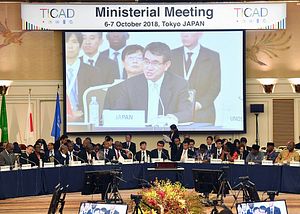On October 7, Tokyo hosted a ministerial meeting attended by representatives from 52 African nations, held ahead of the 7th Tokyo International Conference for African Development (TICAD) to be held in Yokohama in August 2019.
TICAD (which is co-hosted by the government of Japan, UN Development Program, World Bank Group, and African Union Commission) was launched in 1993, with the main objective being to revive global interest in Africa. Prior to that, a number of key geopolitical developments such as the end of the Cold War had resulted in the global community shifting its focus away from the continent.
In the past two decades, TICAD has played a key role in African development. In recent years, the Japanese government has contributed to Africa’s development in a number of important areas. In the phase between 2008-2013 alone, the government of Japan built over 1,300 elementary and middle schools, upgraded nearly 5,000 healthcare and medical facilities, and also provided drinking water to over 10 million people.
During the last TICAD event in 2016, held in Nairobi, Kenya, Japanese Prime Minister Shinzo Abe committed $30 billion in assistance for key areas such as infrastructure and health care over a period of three years.
Beijing will be closely observing the recent meeting for a number of reasons. Most notably, Japanese Foreign Minister Taro Kono unequivocally stated that while Japan was keen to contribute to Africa’s growth story, Tokyo was concerned about the level of debts being incurred by Africa, and was as a result cautious with regard to extending loans. The unspoken message was that Japan had more consideration for African countries than China.
In another subtle comparison to the Chinese approach, Kono made it clear that in helping with infrastructure development in Africa, Japan would want the local population to benefit economically, and was keen that the local populations also learn how to maintain the infrastructure.
Kono also reiterated the point that Japan wants to assist Africa in the spheres of health care and disaster management. Both sides also agreed that people-to-people contact and linkages between Africa and Japan would be beneficial. African leaders categorically stated that Africa welcomes Japanese investments, since they benefit the continent in a number of ways.
It is not just economic linkages and connectivity under discussion. Japan also said that it is keen to connect Africa with Asia and make it part of the Free and Open Indo Pacific Strategy. To this end, New Delhi and Tokyo are working jointly on the Asia-Africa Growth Corridor with a view to enhance connectivity between Africa and Asia, and also propel economic growth.
During his address at TICAD Forum in 2016, Abe also spoke about the need for connecting Asia with Africa, while highlighting Japan’s role. Abe said that “Japan bears the responsibility of fostering the confluence of the Pacific and Indian Oceans and of Asia and Africa into a place that values freedom, the rule of law, and the market economy, free from force or coercion, and making it prosperous.”
Sunday’s TICAD ministerial meeting came a month after the 2018 Forum on Africa and China Cooperation, where China committed $60 billion in financing for Africa. At FOCAC, Chinese President Xi Jinping made a point of addressing skepticism with regard to China’s relations with Africa, specifically in terms of the Belt and Road Initiative (BRI). The Chinese president stated that Beijing wanted the BRI to be win-win, and that China had no intentions of interfering in the internal affairs of African countries. Recent articles in the Chinese media have spoken about the importance of ties between China and Africa, and have made veiled references to the need for Chinese entrepreneurs to understand local cultures better.
Japan does not have the same perception problems.
The Japan International Cooperation Agency (JICA), which coordinates Japan’s overseas assistance, has provided assistance for crucial infrastructural projects in Africa, but in a low key manner. This includes assistance to the Ugandan government for the construction of the Kampala Metropolitan transmission line, carrying electricity from the Karuma Dam. In July 2017, JICA signed a $112 million loan for assisting in infrastructural development around Mombasa Port in Kenya. In Dar es Salaam, Tanzania’s capital, JICA has provided assistance for crucial projects like the Tanzania-Zambia Railway (TAZARA) Flyover Bridge, and construction of a four-kilometer, six lane, Mwenge-Morocco highway.
It is evident that China is likely to face competition in Africa, and Japan has a proven track record of not only providing generous financial assistance, but also building world class infrastructure, all without creating too much hype. Japanese-funded projects have been appreciated. Tokyo’s role in Africa is all the more important given the fact that the United States is not doing much to counter China’s growing presence in Africa.
It is important for Japan to join hands with other countries, especially India, for achieving the goal of making Africa part of the Free and Open Indo-Pacific. Tokyo needs to be complimented for adopting a holistic approach toward Africa, and also being candid with regard to the continent’s economic and political challenges. Japan’s involvement is likely to be beneficial for both Tokyo as well as African countries.
Tridivesh Singh Maini is a New Delhi-based policy analyst associated with the Jindal School of International Affairs, OP Jindal Global University, Sonipat.

































